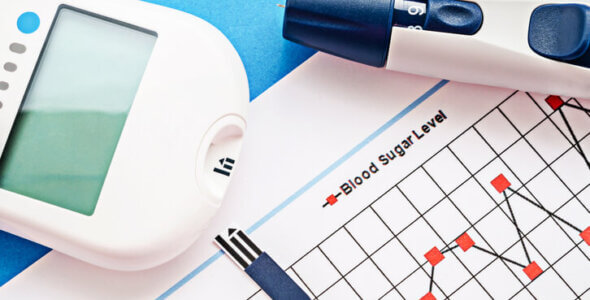Diabetic Glucose Test Strips: Uses and Costs
Table of contents
According to the American Diabetes Association self-monitoring of blood glucose is the key to diabetes management. They recommend that you check your blood glucose roughly 6 to 10 times per day at the following times: before meals and snacks, at bedtime, occasionally after meals, before exercise, when low blood glucose is suspected, after treating low blood glucose until normal levels are reached and before critical tasks! That’s a minimum of 180 strips a month! The truth is diabetes costs money.
Did you know that in the US 38% of people with diabetes have rationed blood glucose testing supplies? Have you spent hundreds of dollars on blood glucose test strips to keep a close eye on your blood glucose levels? We know diabetic test strips are an essential tool in your diabetes care but why are they so expensive! Shopping around is the best way.
Fingerstick glucose meters with test strips are still mostly used to track blood sugar levels, although an increasing number of people with diabetes are now using continuous blood glucose monitors. For answers to questions about the costs, types of tests strips available, and more read on.
What are glucose test strips used for?
As a diabetic, you know that keeping your blood glucose levels under tight control undoubtedly reduces the chance of developing complications of diabetes. Meters and strips are essential medical supplies that are part of your diabetes management to give you an immediate reading of your blood sugar levels.
To take a blood sugar reading, you use a device called a lancet needle to poke your finger to draw a drop of blood. You then apply the drop of blood to a test strip which you then insert into the meter. Most meters produce a reading on the spot. The meter can also store results for later review by you and your doctor.
How do glucose test strips work?
The science behind how blood sugar test strips work is complicated but can be explained in simple terms. The chemicals in the strip (an enzyme and a mediator) react with glucose in your blood to create an electric current, causing electrons to travel to the meter. The meter determines how much glucose was required to generate that much electricity, and uses this to give your blood glucose number on the meter screen!
You simply insert a glucose test strip into the blood glucose meter brand they are designed for. Using a lancing device take your blood sample and place it on the end of the strip where a tiny sensor is enclosed to get a reading. Differences in strip brands are found in the amount of blood required, time to result, and cost.
You must also remember to carry out quality control checks of your blood glucose meter on a regular basis. You use a control solution to make sure the test strips and meter are working properly together.
Are blood glucose test strips covered by insurance?
Test strips are covered by most health insurers, as well as Medicare. But even with this coverage, test strips can often be very pricey, particularly if you have a high deductible health plan. This type of plan might need to pay over-the-counter prices for supplies until you meet the deductible. Your insurance might not cover the brand of test strips that you want. Many insurance plans specify the brands of meters and test strips you can choose from. That means brands not offered will cost much more.
You may need a specific meter that transmits readings to your insulin pump, or you may have switched insurance plans and don’t like the meters and strips covered by their new plans. There is a possible way around this. Your doctor might be able to help you get coverage for diabetes supplies by writing a Letter of Medical Necessity to the insurance company outlining your reasons for the specific request.
Where can I buy diabetic test strips?
You can buy glucose test strips over the counter in the US at independent retail pharmacies, Walmart or online from Amazon or eBay to name a few places.
How much do diabetic test strips cost?
The costs can vary dramatically, and they can add up, especially if you buy them without insurance. Prices change frequently due to offers or bulk buying of strips. To give you a rough idea of the price range, at the time of publication, Walmart showed the following brands at these comparative costs:
Contour Next test strips
- For use with the range of CONTOUR NEXT blood glucose meters.
- Only requires a tiny 0.6 microliters blood sample
- 5-second result
- 100 test strips $37.18
Freestyle lite test strips
- For use only with FreeStyle Lite and Freestyle Freedom Lite Sytems
- Blood sample of 0.3 microliters to perform the test
- 60-second resample window
- 100 test strips $48.00
Freestyle test strips
- For use with FreeStyle (also known as FreeStyle 3 and FreeStyle 5), FreeStyle Flash, and FreeStyle Freedom m
- Small blood sample size, only 0.3 microliter
- Fast, 5-second average test time
- 100 test strips $61.96
Accu-chek Aviva Plus test strips
- For use with Accu-chek Aviva, Accu-chek Aviva Connect, Accu-chek Aviva Combo and Accu-chek Aviva Expert
- 0.6 microliter blood sample
- 100 test strips $49.83
Accu-chek smartview test strips
- For use with Accu-chek Guide and Accu-chek Guide Me
- less than 4-second test
- 100 test strips $84.98
True Metrix blood glucose test strips
- For use with True Metrix, True Metrix Air and True Metrix Go
- A small blood sample, as little as 0. 5 microliters
- 100 test strips $24.00
True track test strips
- For use with Truetrack meter
- 100 test strips $20.98
Onetouch Verio diabetic test strips
- Suitable for use with One-Touch Verio Glucose Test meters
- Requires just a tiny 0.4 microliter blood sample
- Results in just 5 seconds
- 100 test strips $49.66
One-Touch Ultra test strips
- Compatible only with the OneTouch Ultra2 and OneTouch UltraMini meters (OneTouch Verio meters have their own brand of strips)
- Requires just a tiny 0.4 microliter blood sample
- Results in 5 seconds
- 100 test strips $50.94
Accu-chek guide test strips
- Compatible with all three Accu-Chek Guide meter models only (Accu-Chek Aviva and SmartView meters have their own specific strips)
- Requires 0.6 microliter blood sample
- Results in under 4 seconds
- 100 test strips $34.94
ReliOn Premier test strips
- Compatible with all ReliOn meter models
- Requires small 0.5 microliter blood sample size
- Results in 7 seconds
- Allows fingertip or palm testing
- 100 test strips $17.88
Prodigy test strips
- Compatible with all Prodigy meter models: Voice, Pocket, and AutoCode
- Need 0.7 microliter blood sample
- Results in 7 seconds
- Approved for alternate site testing (beyond just fingertips)
- 100 test strips $13.45
Bayer Contour Next test strips
- Compatible with all Contour Next glucose meter models
- Requires 0.6 microliter blood sample
- Results in 5 seconds
- Allows second-chance sampling
- 100 test strips $37.18
Ketone test strips
- A range of many different brands e.g. ReliOn ketone test strips
- 50 test strips $6.64
Medically reviewed
A medical professional has reviewed this article.


Jamie Winn, PharmD
Jamie Winn, PharmD
Dr. Jamie Winn received his Doctor of Pharmacy in 2002 from the University of South Carolina College of Pharmacy, Columbia, SC. Jamie is a medical reviewer for NiceRx.



